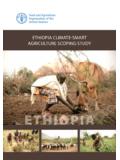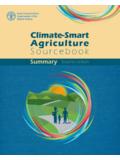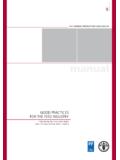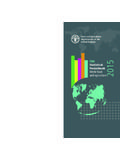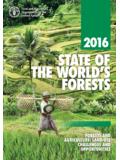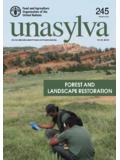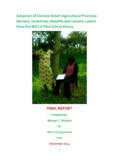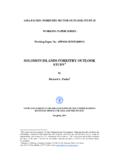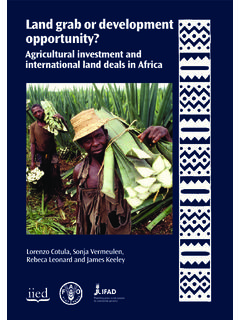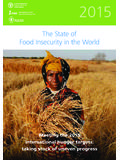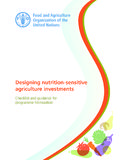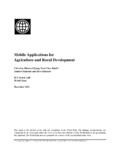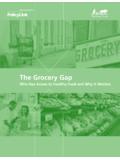Transcription of FAO, private and public partnership model for youth ...
1 FAO, private and public partnership model for youth employment in agricultureExperiences from Malawi, Tanzania Mainland and Zanzibar archipelagoFood and agriculture Organization of the United NationsViale delle Terme di Caracalla 00153 Rome, ItalyPhone: + 39 EMplOyMENTCAsE sTUdy sERiEs # 4 FAO, private and public partnership model for youth employment in agricultureExperiences from Malawi, Tanzania Mainland and Zanzibar archipelagoCAsE sTudiEs sEriEs #4rurAl EMplOyMEnTSocial Protection DivisionEconomic and Social Development DepartmentFood and agriculture Organization of the United Nations (FAO)Rome, 2014 The designations employed and the presentation of material in this information product do not imply the expression of any opinion whatsoever on the part of the Food and agriculture Organization of the United Nations (FAO) concerning the legal or development status of any country, territory, city or area or of its authorities, or concerning the delimitation of its frontiers or boundaries.
2 The mention of specific companies or products of manufacturers, whether or not these have been patented, does not imply that these have been endorsed or recommended by FAO in preference to others of a similar nature that are not views expressed in this information product are those of the author(s) and do not necessarily reflect the views or policies of 978-92-5-108598-1 (PDF) FAO, 2014 FAO encourages the use, reproduction and dissemination of material in this information product. Except where other-wise indicated, material may be copied, downloaded and printed for private study, research and teaching purposes, or for use in non-commercial products or services, provided that appropriate acknowledgement of FAO as the source and copyright holder is given and that FAO s endorsement of users views, products or services is not implied in any requests for translation and adaptation rights, and for resale and other commercial use rights should be made via or addressed to information products are available on the FAO website ( ) and can be purchased through photo FAO Tanzania/Dalla ValleiiiCASE STUDIES SErIES #4 Table of Brief overview of the countries.
3 12. Main challenges for youth entering the agro sector in Malawi, Tanzania and Zanzibar Education and vocational Access to Perception of agriculture and agricultural Access to Access to Climate change FAO private and public partnership (ppp) model for youth employment in Trainings methodology: the Junior Farmer Field and Life Schools (JFFLS).. partnership s Appraisals from countries Linkages with countries policies and Conclusion and and further case study was prepared by Francesca Dalla Valle from the Decent rural Employment Team (DrET) within the Social Protection Division (ESP) of the Food and agriculture Organization of the United Nations (FAO). Thanks go to rob Vos, Director of ESP and Peter Wobst, Senior Economist and DrET Leader, as well as to Mauro Bottaro, Vito Cistulli, Carol Djeddah, Elisenda Estruch Puertas, Francesca Gianfelici, Susan Kaaria, regina Laub, Kae Mihara, Sybil Nelson, Nora Kokanova, Monika Percic, Cristina rapone, Clement De rivas, Nicholas ross, Andrea Sanchez Enciso, reuben Sessa, Tamara van t Wout and Igor Vinci for their constructive inputs and Ilaria Perlini for graphic Malawi, thanks go to FAO in Malawi, in particular, Florence rolle and Alick Nkhoma, respectively FAO representative and Assistant FAO representative for programmes and Norah Mwamadi, National Coordinator.
4 FAO is grateful to the various partners, particularly: Nyandule Phiri, Wezi Kayira, Paul Mkupa Gondwe, Joseph Sinkhala, Boldwin Mkumbadzala, robins Chima, Beatrice Makwenda, Andrew Namakhoma, ronald Phiri, Frank Masankha, Jacob Nyirongo, Priscilla Zimba, Sundays Nyeleza and Caswell Kachingwe. In Tanzania Mainland, thanks go to FAO in Tanzania, in particular, Diana Tempelman and Fredrick Kivaria, respectively FAO representative and Assistant FAO representative, Mbaraka Stambuli, Eliamoni Lyatuu, Martha Kapilima, rehema Marandus, Pilly Bwella and Jeremiah Kabigumila. FAO is grateful to the various partners, particularly: Theresia Msaki, Marietta Mcha, Hassan M Wakasuvi, Willigis O. Mbogoro, Gloria Mazoko, Emmanuel S. Mdidi and all the regional Commissioners involved in the the Zanzibar archipelago, thanks go to Ali Haji ramadhan from FAO and to Affan O.
5 Maalim, Asha A. Abdulla, Omar D. Shajak, Amir, Zaki Khamis, Zainab Saleh Hassan, Asha Omar Fakih as well as to all the Archipelago s regional thanks are given to the Swedish International Development Cooperation Agency (Sida),1 the United Nations Development Assistance Framework (UNDAF)2 and the United Nations Development Assistance Plan (UNDAP)3 for providing funds for the various activities described in this case FMM/GLO/007/MUL - For Tanzania mainland and Malawi2 Malawi3 ZanzibarvCASE STUDIES SErIES #4 AGrA Alliance for a Green revolution in AfricaAIDS Acquired Immune Deficiency SyndromeAIPs Agricultural Investment PlansAU African UnionAYC African youth CharterASSP Agricultural Services Support Programme (Zanzibar)ASSP - L Agricultural Services Support Programme Livestock (Zanzibar)ASWAp agriculture Sector Wide Approach (Malawi)CAADP Comprehensive Africa agriculture Development ProgrammeCUZA Cooperative Union of ZanzibarECF Food and agriculture Organization of the United NationsFAO Ministry of TradeFUM Farmers Union of MalawiGDP Gross Domestic ProductGoM Government of MalawiGoT Government of TanzaniaHIV Human Immunodeficiency VirusIFAD International Fund for Agricultural DevelopmentILO International Labour OrganizationIMF International Monetary FundIPM Integrated Pest ManagementJFFLS Junior Farmer Field and Life SchoolsMDGS Malawi Growth and Development StrategyMKUKUTA National Strategy for Growth and reduction Poverty (Tanzania mainland)MKUZA National Strategy for Growth and reduction Poverty (Zanzibar)NASFAM National Smallholder s Farmers Association of MalawiNEPAD (The)
6 New partnership for Africa s DevelopmentNGO Non-Governmental OrganizationNLP National Land PolicyPMO-rALG Prime Minister s Office for regional Administration and Local Government (Tanzania mainland)PO-rALG President Office regional Administration and Local Government (Zanzibar)PPP private public PartnershipPS Permanent SecretaryrCA (FAO s) regional Conference for AfricarGoZ revolutionary Government of ZanzibarSACCOs Savings Union CooperativesSida Swedish International Development Cooperation AgencyTAFSIP Tanzania agriculture and Food Security Investment PlanTEVETA Technical, Entrepreneurship and Vocational Education and Training Authority (Malawi)TFC Tanzania Federation of CooperativesUN United NationsUNDAF United Nations Development Assistance Framework (Malawi)UNDAP United Nations Development Assistance Plan (Tanzania mainland and Zanzibar)VETA Vocational Education and Training Authority (Tanzania)YEN youth Employment NetworkY2Y youth -to- youth fundAcronymssummaryThe Food and agriculture Organization of the United Nations (FAO) leads international efforts to defeat hunger and mitigate poverty by helping developing countries and countries in transition to modernize and improve their agriculture , forestry and fisheries practices and to ensure food and nutrition security for all.
7 Furthermore, as stressed by FAO,4 improving policy coherence between employment and agricultural initiatives and investing more in the promotion of decent rural employment make a significant contribution to the interlinked challenges of fighting rural poverty and feeding a growing and increasingly young population in a sustainable way. Achieving food security for all is at the heart of FAO s mandate and given the prevalence of poverty and food insecurity among rural youth , they have long been a target of FAO s activities. Furthermore, the Organization has recently strengthened its commitment to rural youth in its new Strategic This framework focuses FAO s efforts and resources on achieving five strategic objectives. Underlying the third strategic objective reducing rural poverty is an explicit emphasis on the promotion of decent employment opportunities for rural youth .
8 This reflects the importance that FAO assigns to youth development as a catalyst for reducing poverty and improving food and nutrition security. It also signals FAO s intent to address youth employment in a comprehensive way, redirecting expertise and efforts throughout the Organization. Since 2011, FAO has developed an innovative public - private partnership model for youth employment in agriculture , and has piloted the model in Malawi, Tanzania Mainland and Zanzibar An integrated model as initiated in the countries resulted as the most suitable approach to respond to the specific needs of rural youth in terms of decent job creation. A productive economic opportunity in the agro sector needs various components. It requires capacity development adapted to rural youth s levels of understanding and labour markets opportunities; it further requires facilitation and mentorship in adequately accessing land, credit and markets while also enhancing the opportunities for youth inclusion in policy and strategic debates concerning their wellbeing and national economic development.
9 The integrated activities cover policy support and implementation with a focus on the inclusion of rural youth populations. Strategic and normative support with the development of contextualized training materials, as well as the piloting of a demonstrational operational model are also fundamental parts of the overall support. The joint integration of these various components, when appropriately facilitated, supported and coordinated by a variety of partners who add their specific comparative advantage to the model , potentially lead to successful agro sector economic opportunities and self-employment job creation for rural activities implemented under the model are fully aligned with relevant policies and strategies in Malawi, Tanzania Mainland and Zanzibar. Moreover, activities are fully in line with the major recommendations of FAO s 27th regional Conference for Africa (rCA),7 particulary with one of the regional prioritizations highlighted, which is the need to work towards the facilitation and consequent integration of young women and men into the agricultural sector.
10 It is also aligned with the proceedings of the 28th rCA, in which countries have been reminded that economic growth can only happen if youth are included in countries agricultural and economic efforts have been channeled towards public - private partnerships in order to reach a sustainable national inclusion of the activities while strengthening partners capacities to apply the model in order to address youth unemployment, underemployment and working poverty in rural FAO. 2012. Decent rural employment for food security: a case for action. rome5 For more information on FAO s strategic framework see: The activity is one of the outputs of the overall project: Policy support on rural employment and decent work towards equitable and sustainable livelihoods under conditions of climate change7 27th FAO regional Conference for Africa.
